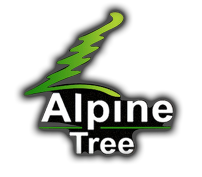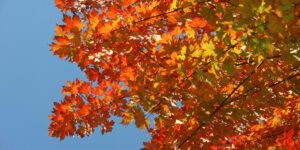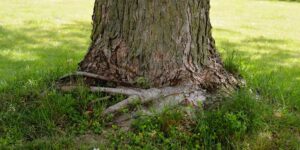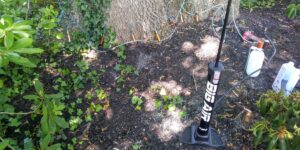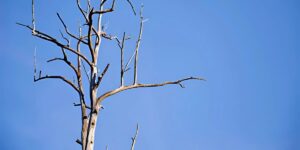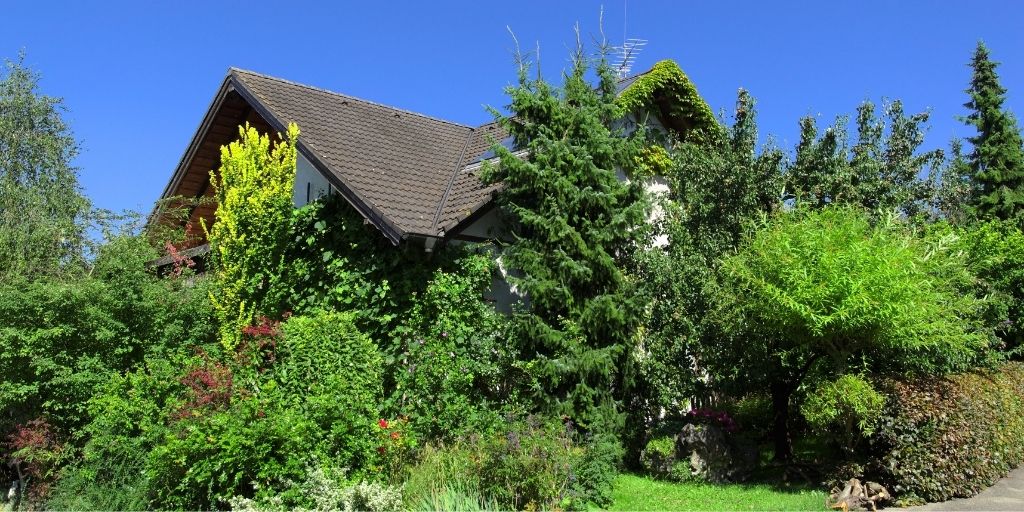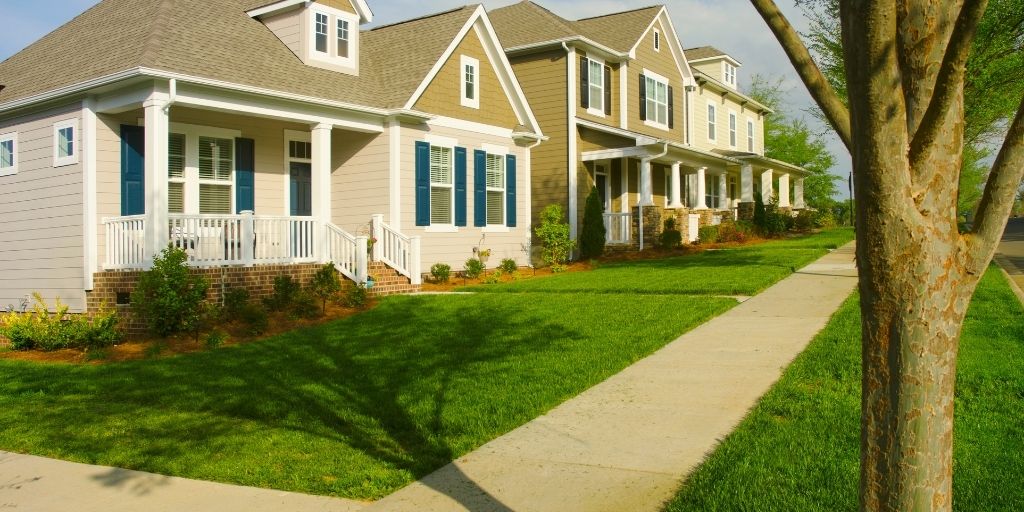Did you know that trees can have a significant impact on the value of your home and property? If you’re planning to sell your home, you’re probably looking for ways to increase the final sale price. While many people look at updating kitchens or bathrooms, one of the most effective ways to increase the value of your home is actually outside the house: your trees and landscaping. Trees can make or break your property’s value.
In this article, we show you:
- how to use trees to increase the value of your home (and the homes around you),
- when trees can actually harm your chances of a bigger sale,
- what to do if you plan to put your house on the market, and
- what you can do if you don’t plan on selling any time soon.
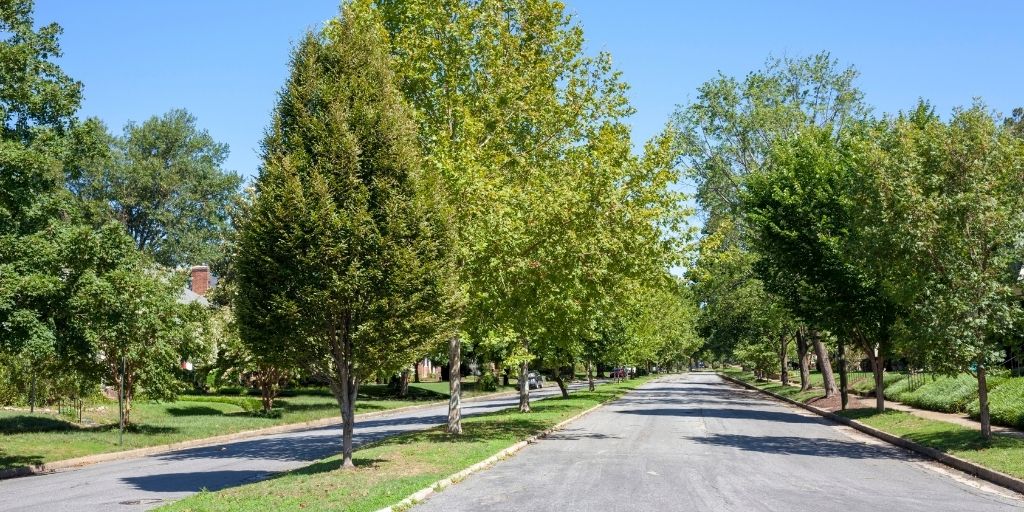
Homes in neighborhoods with more trees tend to have higher property values.
How Trees Increase Your Property Value
Realtors and buyers both feel that healthy, mature trees add value to your home. And research agrees with them.
For example, this Arbor Day Foundation article tells you why having trees in your garden and along the sidewalk improves not only the appearance of your home but its value. And this research estimates an increase of 3% to 15% to a home’s value if it has large trees growing around it.
With the average value of homes in the Morristown, NJ area currently around $678,847 (according to Zillow), a 3-15% increase in the sale price can make a huge difference!
Since bigger trees are better when it comes to property value, think about planting those trees now, instead of later.
Beyond that, here are some things you can do to ensure that the trees on your property contribute to its overall value, as well as to your enjoyment of your home and garden.
Prune Trees and Shrubs Regularly
It’s better for a woody plant’s health to have regular, light pruning rather than infrequent, major pruning. Light pruning doesn’t stress your trees and shrubs by removing too much foliage, and it lets them keep a more natural shape.
Instead of having drastic pruning done all at once, schedule pruning every year or two. And be sure to have your pruning done the professional way by a certified arborist.
Always Remove a Dead Tree
When you’re selling your home, you’ll want to remove any dead trees before listing your house. A dead tree can be dangerous, as it can drop branches or fall at any time.
And you want potential buyers to see the value and beauty of your landscape instead of calculating tree removal costs.
Tidy Up Your Yard
Curb appeal is real and first impressions can make or break a potential home sale!
It doesn’t cost a lot to have your garden regularly cleaned up before you list your house and while it’s on the market. Here are a few easy cleanup tasks:
- Remove dead, dying, or diseased plants
- Cut back any plant that’s outgrown its space
- Consider planting a few flowering annuals to brighten things up (putting these in colorful pots can add an extra pop of color to catch a buyer’s eye)
- Spread a 2 to 3-inch layer of wood mulch (or fluff up existing mulch) in planting beds and around trees and shrubs for a well-kept look
Landscape Mistakes That Will Decrease Your Property Value
A Diseased or Dying Tree
While mature trees add value to your home, a dying or diseased tree does not.
If you have a tree that’s losing its leaves, bark, or branches, has oozing wounds, or is growing mushrooms on its trunk, you should remove it before you put your house on the market.
In these cases, removing a tree adds value to your home. It’s better to have a tidy, mulched area from a ground-out tree stump than a dying tree; a potential buyer will see possibilities instead of removal costs.
An Overgrown Landscape
If your landscape is overgrown or blocking the view of your house, it won’t make a good first impression on buyers.
Have your trees and shrubs professionally pruned as soon as you know you’ll be selling your house. You’ll want new leaf growth to soften recently pruned areas and cover pruning cuts, which will take a little time.
If you’re selling your house during the dormant season, focus pruning efforts on the structure of your trees. Winter is when you can safely have your trees pruned extensively without fear of insects and diseases. Make sure the bare branches have a pleasing look and stable structure that enhances the curb appeal of your home.
The Wrong Tree for Your Property
Healthy trees add to property value, but the wrong tree in the wrong place won’t.
Your tree may be a negative asset if you have:
- a mature tree that’s too large for its location
- a tree that’s misshapen from excessive pruning to keep it small
- branches growing over your neighbor’s fence, or
- branches blocking views, sidewalks, driveways, or entryways
Mature trees add a lot of value to your home, but a poorly placed tree can do the opposite. If you have a tree that’s in the wrong spot, consider removing it before you put your house up for sale.
Non-native Trees
The worth of a native tree to your home’s value may be greater than a non-native one.
While there are many non-native trees that thrive in our part of New Jersey, some of these require more maintenance in our particular climate and soil. Potential buyers may not want to take on extra maintenance chores to keep those trees looking their best.
If you’re planning a new garden or intend to sell your house in the future, consider choosing a native tree species.
And no matter what tree you choose, plant it properly to help ensure its future vigor.
Trees Too Close to Your Home
Beautiful trees can help sell a house. But if they were planted too close to your house, driveway, or sidewalk, their roots can cause damage and you’ll have an expensive problem.
Have a professional tree care expert evaluate the situation and explain your options. Depending on the tree, you may be able to avoid or repair the problem of damaging roots.
Struggling Trees
A tree that’s not vigorously growing may just need some care, such as fertilizing, soil aerating, or treatment for insects. Have your struggling trees evaluated by an arborist sooner rather than later so that they will be assets when you sell your house.
Exposed Roots
A tree’s roots belong underground, but sometimes they grow at the soil surface. This is because shallow irrigation designed for turfgrass will keep tree roots from growing down into the soil.
If you have a tree with exposed roots, the best thing to do is leave it alone. Don’t cover roots with soil or mulch, and don’t cut them off!
If you’re worried the tree’s roots are a tripping hazard, or that the tree is not anchored securely in the soil, call an arborist for an evaluation.
Trees That Make a Mess
The importance of a tree to your home’s value can be harder to see if you’re always cleaning up after it.
Not all trees belong in all places!
If you are thinking of planting trees to increase your property value, choose a tree species that won’t:
- Drop leaves onto decks or into pools
- Have sticky fruit or pollen that lands on sidewalks, driveways, or cars
Choose a tree whose natural habits work with its location.
Planning to Sell Your Home Soon? How to Get Maximum Value From Trees
If you’re planning to sell your house soon and want to maximize the value of your landscape, here’s what to focus on:
- Replace trees that were removed. If you had a tree removed from your garden, plant a new tree in its place. A young tree is small, but it tells homebuyers you understand how valuable trees are for shade, habitat, and good air quality around your home.
- Plant trees and shrubs in bare areas. A fully planted garden, even one with new, small plants and trees, is more valuable than a partially planted one. Fill in empty spots with young trees and new shrubs so that your garden looks complete.
- Mulch and clean up. Your garden doesn’t have to be perfect to help sell your home. A neatly maintained, well-mulched landscape adds lasting value. Don’t forget that you can make mulch from the trees you prune or remove!
- Schedule a tree inspection. The best way to maximize the value of your trees is to have them inspected. That way, any issues can be quickly corrected before they become a significant problem. We have years of experience evaluating trees; contact us for more details.
Plan Ahead to Maximize Your Future Property Value
What if you don’t plan to move any time soon?
You have more time to plan!
By planning ahead, you’ll have more time to choose trees, plant them, and watch them grow. Our tree planting services can help you every step of the way.
Then sit back and enjoy both your landscape improvements and their impact on your property value!
The more years you have to improve and maintain your landscaping, including the trees and shrubs, the greater the return on your investment. But doing it now means you’ll get to enjoy more time in your yard until you’re ready to sell your home!
